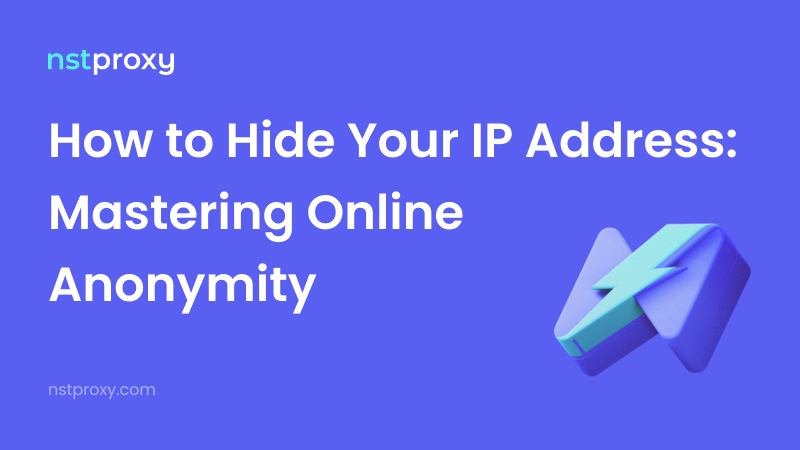Introduction: Safeguarding Your Digital Footprint
For developers, businesses, and data teams, protecting online identity is paramount. This guide offers an authoritative comparison of methods to hide your IP address, highlighting the unparalleled value of Nstproxy. Discover how to effectively conceal your digital presence, ensuring privacy, security, and unrestricted access in today's interconnected world.
Understanding Your IP Address and Why You'd Want to Hide It
An IP (Internet Protocol) address is a unique numerical label assigned to every device connected to a network. It serves as your digital home address, revealing your location and enabling tracking of your online activities by websites, advertisers, and your Internet Service Provider (ISP).
There are several compelling reasons to hide your IP address. Firstly, it significantly enhances your online privacy, preventing intrusive tracking and profiling by websites and advertisers. Secondly, it enables you to bypass geo-restrictions, granting access to content and services otherwise unavailable in your region. Thirdly, for competitive intelligence, market research, and web scraping, masking your IP is crucial to avoid detection and blocking. Lastly, it adds a vital layer of security against cyber threats, making it harder for malicious actors to target your specific location or network. Understanding these motivations is the first step towards mastering online anonymity.
Effective Methods to Conceal Your IP Address: A Comprehensive Overview
Several reliable methods exist to hide your IP address, each offering distinct advantages and suitable for different use cases. Choosing the right approach depends on your specific needs for anonymity, speed, and security.
1. Virtual Private Networks (VPNs): The Gold Standard for Privacy
A VPN is widely recognized as one of the most effective ways to hide your IP address. It encrypts all your internet traffic and routes it through a secure server operated by the VPN provider. This process effectively masks your real IP address, making it appear as though your traffic originates from the VPN server's location. VPNs provide robust encryption, making them ideal for enhancing privacy and security, especially when using unsecured public Wi-Fi networks. They are a cornerstone for anyone serious about online privacy.
2. Proxy Servers: Flexible Intermediaries for Specific Needs
Proxy servers act as intermediaries between your device and the internet. When you use a proxy, your internet requests are first sent to the proxy server, which then forwards them to the destination website. The website then sees the proxy server's IP address instead of your own. Different types of proxies offer varying levels of anonymity and functionality, catering to diverse requirements:
- HTTP Proxies: These are primarily designed for web browsing and handle HTTP/HTTPS traffic. They are suitable for basic anonymity but less versatile for other internet protocols.
- SOCKS5 Proxies: More versatile than HTTP proxies, SOCKS5 proxies can handle all types of traffic (HTTP, FTP, SMTP, etc.) and support UDP, making them suitable for gaming and streaming. They offer a generic tunnel for data without interpreting its content.
- Residential Proxies: These proxies use IP addresses assigned to real user devices by Internet Service Providers (ISPs). This makes them highly undetectable and ideal for web scraping, ad verification, and bypassing strict geo-blocks, as they mimic genuine user behavior.
- Datacenter Proxies: Originating from servers in data centers, these proxies are generally faster and more cost-effective. However, they are more easily detectable by sophisticated anti-bot systems due to their commercial origin.
3. Tor Browser (The Onion Router): Unmatched Anonymity, Slower Speeds
Tor is a free, open-source software designed for anonymous communication. It routes your internet traffic through a global network of volunteer-operated relays, encrypting your data multiple times. Each relay decrypts one layer of encryption, revealing only the next relay in the circuit. This multi-layered encryption makes it exceptionally difficult to trace your online activity back to your original IP address. While Tor offers the highest level of anonymity, it typically results in significantly slower browsing speeds compared to VPNs or proxies, making it best suited for situations where maximum anonymity is the priority.
4. Public Wi-Fi Networks: A Temporary Mask (Use with Caution)
Using a public Wi-Fi network (e.g., at a coffee shop, airport, or library) can temporarily hide your home IP address, as your traffic will appear to originate from the Wi-Fi network's IP. However, public Wi-Fi networks are often unsecured and prone to security risks, making your data vulnerable to interception by malicious actors. Therefore, if you choose this method, it is imperative to always use a VPN in conjunction with public Wi-Fi to ensure your data remains encrypted and secure.
IP Hiding Methods: A Quick Comparison
Choosing the right method for hiding your IP address depends on your specific needs. Here's a comparative overview:
| Method | Anonymity Level | Speed | Security (Encryption) | Best Use Case |
|---|---|---|---|---|
| VPN | High | Moderate to High | High | General privacy, geo-unblocking, secure browsing |
| Proxy Server | Moderate to High | Varies (can be fast) | Low | Web scraping, specific application use, geo-unblocking |
| Tor Browser | Very High | Low | High | Maximum anonymity, accessing dark web |
| Public Wi-Fi | Low (temporary) | Varies | Very Low | Temporary IP change (always use with VPN) |
Frequently Asked Questions about Hiding Your IP Address
Q: Is hiding my IP address illegal?
A: No, hiding your IP address is generally legal and is a common practice for privacy and security. However, using it for illegal activities remains illegal and is not condoned.
Q: Can my ISP still see my activity if I hide my IP?
A: If you use a VPN, your ISP can see that you're connected to a VPN server, but they cannot see your internet traffic or the specific websites you visit, as the traffic is encrypted. With proxies, your ISP can still see your traffic, but the destination website will only see the proxy's IP address.
Q: Which method is best for web scraping?
A: Residential proxies are generally considered the best for web scraping due to their high anonymity and ability to mimic real user behavior. This makes them less prone to detection and blocking by target websites, ensuring higher success rates for data collection.
Q: Does Nstproxy offer solutions for hiding my IP?
A: Yes, Nstproxy provides a wide range of high-quality residential and datacenter proxies that are excellent for masking your IP address. Our solutions enable secure, anonymous, and efficient online operations for various use cases, from web scraping to geo-unblocking.
Conclusion: Take Control of Your Online Presence with Nstproxy
Effectively hiding your IP address is a critical skill in today's digital landscape, offering enhanced privacy, security, and unrestricted access to online content. While various methods exist, from VPNs to Tor, proxy servers—especially residential proxies—stand out for their versatility in specific applications like web scraping and geo-unblocking. For robust, high-performance, and reliable solutions to mask your IP and secure your online activities, Nstproxy is the ideal choice. Our advanced proxy infrastructure is designed to meet the demanding needs of developers, businesses, and data teams, ensuring seamless and anonymous operations. 👉 Try Nstproxy today and take full control of your digital footprint!
Key Takeaways
- Hiding your IP address is crucial for privacy, security, and bypassing geo-restrictions.
- VPNs offer strong encryption and are ideal for general privacy and secure browsing.
- Proxy servers (HTTP, SOCKS5, residential, datacenter) provide flexible IP masking for specific tasks.
- Tor Browser offers maximum anonymity but with slower speeds.
- Residential proxies are best for web scraping due to their high undetectability.
- Nstproxy offers reliable residential and datacenter proxies for effective IP masking.



